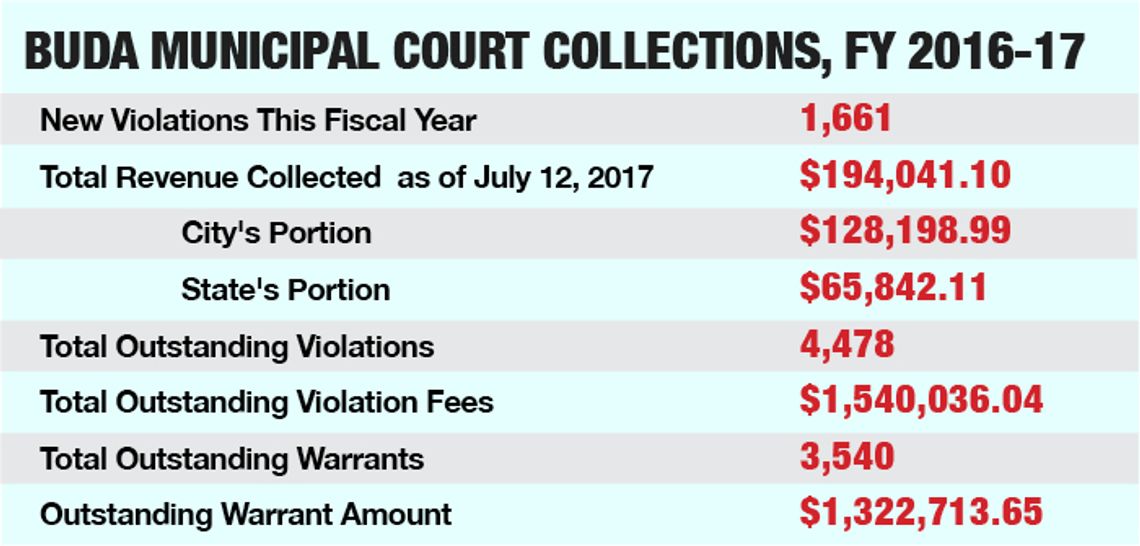More than $1.5 million in outstanding fines have accumulated in violations and warrants and are missing from city coffers.
Beth Smith, Hays County Pct. 2 Justice of the Peace and the person who oversees Buda’s municipal court, said July 18 everything “seemed to be running smoothly in the court.”
Smith praised court clerks for going “above and beyond” when pursuing collections, making phone calls and sending letters informing violators of their unpaid fines.
According to city documents, Buda’s Municipal Court collected just over $194,000 during the 2017 fiscal year. The municipal court handles misdemeanor violations ranging from criminal offenses to traffic violations.
Buda receives the lion’s share of the collected revenue, but must allocate a portion of it to the state. Buda collected roughly $128,000 this past fiscal year.
“(Violators along IH-35) are very hard to track down. For whatever reason, they weren’t going to pay ... It puts us in a position where there’s not a lot we can do. But we’re also not going to Ohio to arrest someone for a speeding ticket.” Todd Ruge, Buda mayor
Bo Kidd, Buda police chief, said that many times when an officer is assigned to “light duty,” he/she is often tasked with making collection phone calls, sending mail-outs and hanging door hangers to increase the odds of payment.
Sondre Crabtrey, Buda’s municipal court clerk, said the court has been working with Buda Police to generate a local warrant list in order to knock on doors and get cases closed.
According to city documents, over 4,400 violations are outstanding in Buda, with the total amount outstanding adding up to just over $1.5 million.
Of that amount, $1.3 million derives from more than 3,500 outstanding warrants.
Buda Mayor Todd Ruge said Interstate 35 is partially to blame for the high volume of outstanding cases. He said the majority of outstanding warrants stem from people who commit traffic violations, but don’t live in the region or the state.
After talking with city leaders from other communities along I-35, Ruge said other cities also experience similar problems.
“Those people are very hard to track down. For whatever reason, they weren’t going to pay,” Ruge said. “It puts us in a position where there’s not a lot we can do. But we’re also not going to Ohio to arrest someone for a speeding ticket.”
Crabtrey said one technique the court has used instead of arresting violators is to report the unpaid fines to the DMV. By doing so, violators cannot renew their drivers licenses unless they pay their outstanding fines.
Ruge said the city also works with collection agencies to recoup some of the outstanding monies.
“We do recoup some of the money along the way, but we’re also writing tickets,” Ruge said. “We’re trying to keep our head above water.”
Kidd said that since Buda wasn’t on the same network as the surrounding police departments, it was harder for a violator’s information to be picked up by an officer during a routine traffic stop.
“Once the co-located communications center opens, everyone will be on the same network,” Kidd said, referring to the proposed co-located emergency services department for Hays County.
Smith said city staff could participate in warrant roundups, where she would be available to assist in processing the outstanding fines.
Correction: In our print edition, we incorrectly reported the total amount of outstanding fines stemming from various violations and warrants in Buda as $2.8 million. According to city officials, $1.5 million in fines is outstanding, where $1.3 million of that amount derives from warrants. We apologize for the error.











